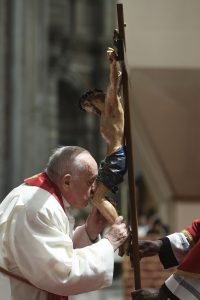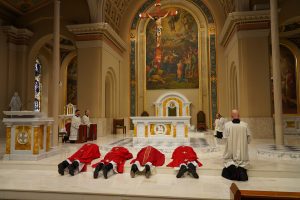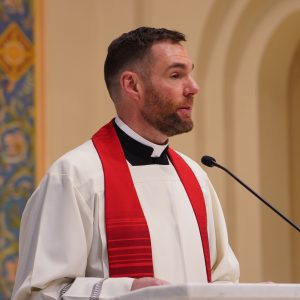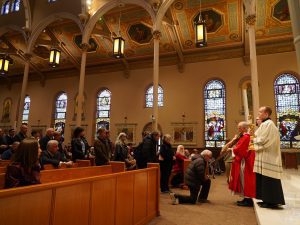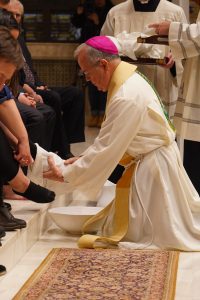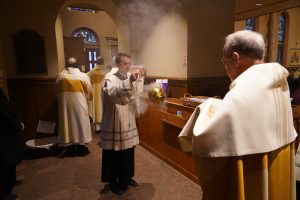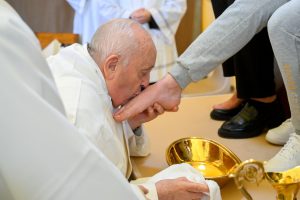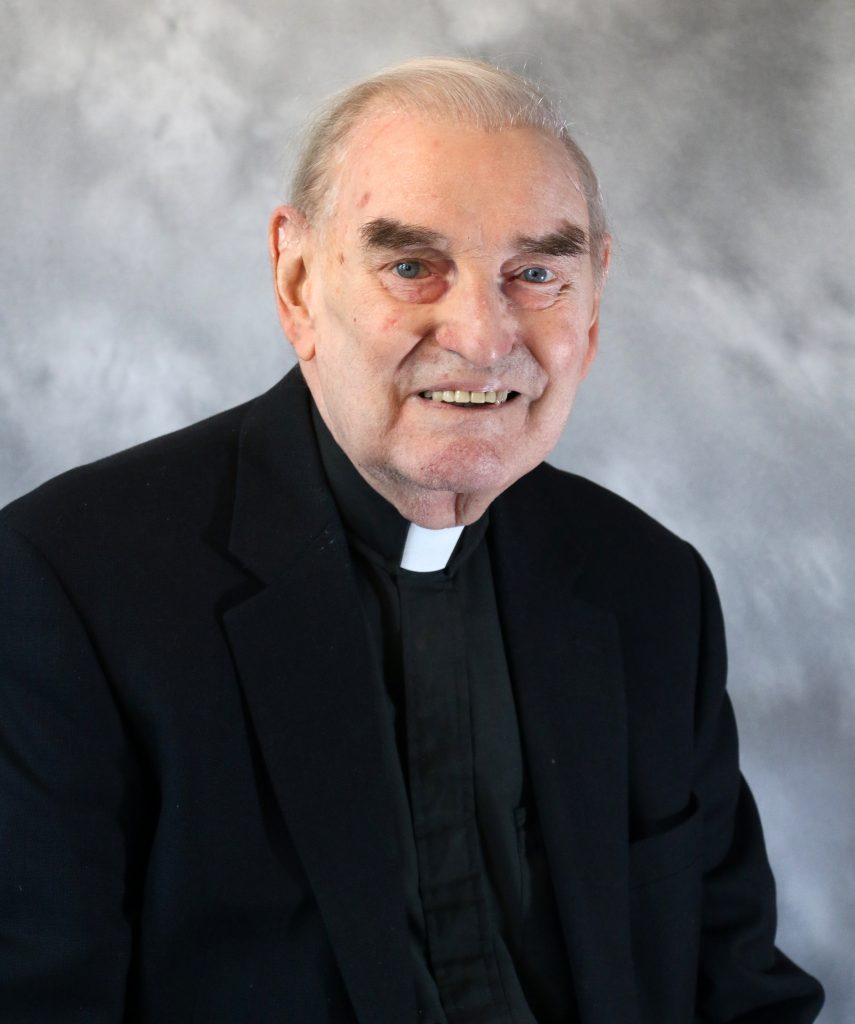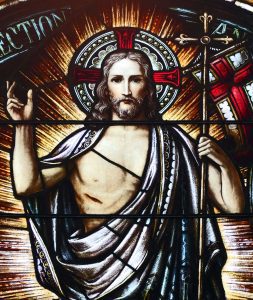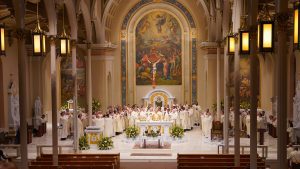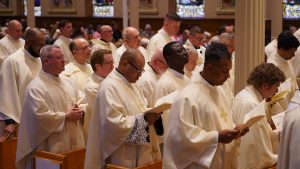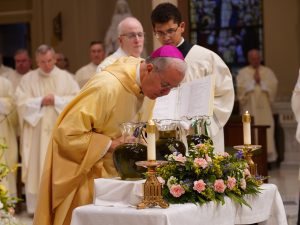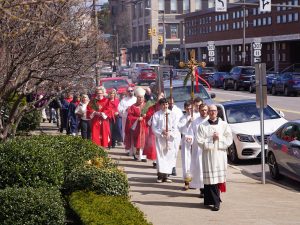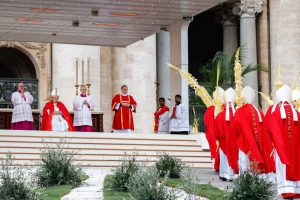ROME (CNS) – For the second year in a row, Pope Francis followed the nighttime Way of the Cross service from his Vatican residence as 25,000 people gathered outside Rome’s Colosseum.
While he had been scheduled to attend in person, the Vatican released a communique right at the start of the service March 29 that the pope would follow the event at home “to conserve his health ahead of tomorrow’s vigil and Easter Sunday Mass.”
Workers carried away the white chair that had been set up for the pope atop a hillside overlooking the ancient amphitheater and Cardinal Angelo De Donatis, papal vicar for Rome, filled in for the pope, offering the final blessing at the end of the ceremony.
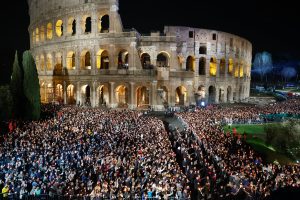
While the late night temperatures in Rome March 29 were in the low 60s, there was a slight breeze and 45% humidity. The pope also skipped attending the Colosseum event last year after he had been released just six days prior from the hospital where he had spent three nights for a respiratory infection.
Each year, the pope chooses a different person or group of people to write the series of prayers and reflections that are read aloud for each of the 14 stations, which commemorate Christ’s condemnation, his carrying the cross to Golgotha, his crucifixion and his burial.
This year the commentaries and prayers were written by Pope Francis and were meant, during this Year of Prayer, to “accompany” Jesus on his own journey of prayer during his passion.
“Of us, you asked only one thing: to remain with you and to keep awake. You did not ask something impossible, but simply closeness. We now take this time to be with you. We want to spend it in closeness to you,” the pope wrote in his introduction to the solemn torch-lit service in the Colosseum.
“How many times, though, have I strayed far from you! How many times, like the disciples, rather than keeping awake, have I instead fallen asleep! How many times have I failed to find the time or the desire to pray, whether from weariness, distraction or dullness of mind and heart! Lord Jesus, say once more to me and to us, your Church: ‘Get up and pray,'” the pope wrote.
Different groups of people representing different segments of the church and society passed a bare wooden cross from one group to the next in succession. Those chosen to lead the Way of the Cross included minors living in foster homes, people with disabilities, migrants, catechists, priests and cloistered nuns.
Instead of the traditional station for “Jesus falls for the third time,” the pope created a meditation for the 11th Station dedicated to “Jesus’ cry of abandonment,” reflecting on Jesus’ “unexpected” prayer of “My God, my God, why have you forsaken me?”
“At the height of your passion, you experience the distance of the Father; you no longer even call him ‘Father,’ but ‘God,’ almost as if you can no longer glimpse his face. Why?” the meditation said.
“So that you can plunge into the abyss of our pain. You did this for my sake, so that when I see only darkness, when I experience the collapse of my certainties and the wreckage of my life, I will no longer feel alone, but realize that you are there beside me,” it said.
The prayers included asking Jesus to “help me recognize you and love you”: in the unborn and abandoned children; in young people in pain; in the elderly who have been forgotten; in prisoners; and in those who are exploited and ignored.
For the eighth Station, “Jesus meets the women of Jerusalem,” the pope highlighted those who remained with Jesus to the end along the way of the cross.
“Those ordinary people who are great in your eyes, yet small in the eyes of the world. There are the women, in whom you inspired hope: they have no voice, yet they make their presence felt,” the meditation said.
“Help us to recognize the dignity of those women who remained faithful and stood by you in your passion, and those who in our own day are exploited and endure injustice and indignity,” it said.
The pope’s reflection asked people to consider: “When I am faced with the tragedies of today’s world, is my heart frozen or does it melt? How do I react when I see the madness of war, the faces of children no longer able to smile and of mothers who see them hungry and underfed, and have no more tears to shed?”
“Jesus, you wept over Jerusalem; you weep over the hardness of our hearts,” it said, asking people pray to Jesus to “melt my hardened heart.”
For the 12th Station, “Jesus dies, commending himself to the Father and the good thief to paradise,” the pope underlined “the amazing power of prayer” that led a criminal to heaven.
“God of the impossible, you turn a thief into a saint,” it said, because “If you remember me, my evil will no longer be an endpoint but a new beginning.”
The concluding reflection at the 14th Station asked the faithful to think about “what new gift will I give Jesus this Easter? A little more time to spend with him? A little more love for others?”
“It will truly be Easter if only I give something of myself to the One who gave his life for me. For it is in giving that we receive, and we find our lives whenever we lose them, our possessions whenever we give them away,” it said.
Earlier in the day in St. Peter’s Basilica, Pope Francis presided over the Liturgy of the Lord’s Passion, which commemorates Christ’s passion and death on the cross.
The pope arrived in a wheelchair and began the rite after a moment of silent prayer before the main altar, which was framed by covered scaffolding encapsulating the immense baldachin undergoing a 10-month-long restoration.
Following tradition, the homily was delivered by Cardinal Raniero Cantalamessa, preacher of the papal household.
The papal preacher said, God’s power is the power of his humble, defenseless love.
He reflected on how Jesus overturned the worldly ideas people had of God and revealed his true face.
“Unfortunately, in our unconscious, we continue to carry on this very idea of God that Jesus came to change. We can speak of a God who is pure spirit, supreme being, and so on, but how can we see him in the annihilation of his death on the cross?” the cardinal asked.
“The Father reveals the true face of his omnipotence in his Son who kneels before the disciples to wash their feet; in him who is reduced to the most radical powerlessness on the cross and continues to love and forgive, without condemning anyone,” Cardinal Cantalamessa said.
“The omnipotence of God is the omnipotence of defenseless love,” he said.
“What a lesson for us who, more or less consciously, always want to show off. What a lesson for the powerful of the earth,” especially those who pursue power only for power’s sake and those who “oppress the people and, in addition, ‘call themselves benefactors,'” the cardinal said.
Conquering death, the Risen Christ does not seek revenge “to humiliate his opponents. He does not appear in their midst to prove them wrong or to mock their impotent anger,” the cardinal said, because that “would be incompatible with the love that Christ wanted to bear witness to in his passion.”

